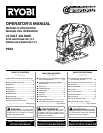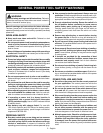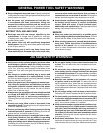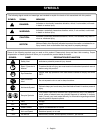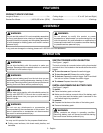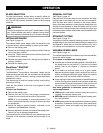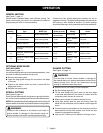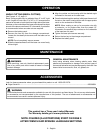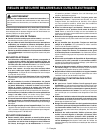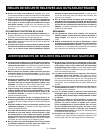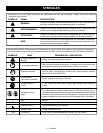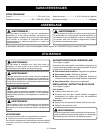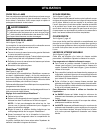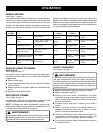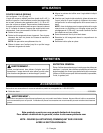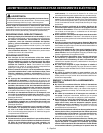
7 - English
OPERATION
ORBITAL MOTION
See Figure 7, page 11.
Orbital motion provides faster, more efficient cutting. The
blade cuts through your work in the upstroke but does not
drag across your work in the downstroke.
Orbital
Setting
Material
Type
Suggested
Blade Type
TPI
(Teeth per inch)
Speed
Setting
Orbital
Action
0
Counter Top, Laminate
Board
Wood Cutting Blade
10-12 (Down
Stroke Blade)
Max Speed No Orbit
Thin Sheet Metal Metal Cutting Blade 14-24
Slow - Medium
Speed
No Orbit
1
Plastics and PVC Wood Cutting Blade 10-12 Medium Speed Minimal Orbit
Scrolling or Curving Cuts
in Wood
Scrolling Wood Blade 10-12 Max Speed Minimal Orbit
2
Plywood, Decking and
Hardwood
Wood Cutting Blade 6-12
Medium - Max
Speed
Medium Orbit
3
General Lumber and
Soft Wood
Wood Cutting Blade 6-10
Medium - Max
Speed
Maximum Orbit
Choose from four orbital adjustment positions for fine to
aggressive cutting. The higher settings should be used when
fast cutting in soft material is desired. The lower settings
should be used when cutting materials with more resistance.
OPTIONAL EDGE GUIDE
(NOT INCLUDED)
See Figure 8, page 11.
An optional edge guide may be purchased separately. It can
be used for making crosscuts and rip cuts.
Remove the battery pack.
Insert the edge guide through the two slots in the base
of the saw.
Adjust to the desired width and lock in place with the
edge guide screw.
Replace the battery pack.
SCROLL CUTTING
See Figure 9, page 11.
Scroll cuts can be made with the jig saw by guiding the direc-
tion of the cut with applied pressure on the handle as shown.
NOTE: Using blades specifically designed for scroll cutting will
reduce stress on the saw and produce better cutting results.
WARNING:
Excessive side pressure to the blade could result in
broken blades or damage to the material being cut.
Broken blades could result in serious personal injury.
PLUNGE CUTTING
See Figure 10, page 11.
WARNING:
To avoid loss of control, broken blades, or damage to
the material being cut, always use extreme caution when
making plunge cuts. We do not recommend plunge
cutting on materials other than wood.
Mark the line of cut clearly on the workpiece.
Set the cutting angle at 0°.
Tilt the saw forward so that it rests on the front edge
of the base and blade will not come in contact with the
workpiece when the saw is turned on.
Make sure the blade is inside the area to be cut.
Using high speed, start the saw and slowly lower the
blade into the workpiece until the blade cuts through the
wood.
Continue lowering the blade into the workpiece until the
base rests flat on the work surface, then move the saw
forward to complete the opening.
Use only the 7 teeth per inch blade for this type of cut.



